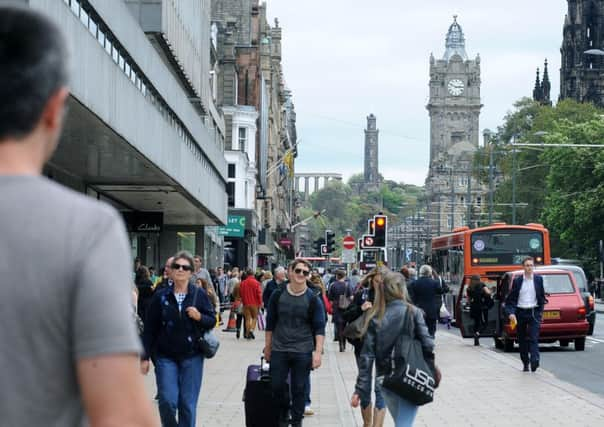Summer outlook is far from sunny for retail sector
This article contains affiliate links. We may earn a small commission on items purchased through this article, but that does not affect our editorial judgement.


Visa’s Consumer Spending Index report for May shows a fall in overall consumer spending for first time in nearly four years with a 0.8 per cent drop compared to a year ago. The headline fall comes on the back of a series of marked slowdowns in growth reported since the beginning of the year and the election result is likely to further add to consumer uncertainty.
• READ MORE: General election news
Kevin Jenkins, managing director at Visa in the UK, says that with rising prices and stalling wage growth, it was clear “more of us are starting to feel the squeeze”.
Advertisement
Hide AdAdvertisement
Hide Ad“Bricks-and-mortar retailers had a particularly challenging month, with sales dropping at the quickest level in over five years, at a time when warmer weather and the May bank holidays would usually drive shoppers on to the high street,” he said.
“Face-to-face” spending in shops fell significantly (down 5.3 per cent) with clothing and footwear (down 5.2 per cent) and household goods (down 4.1 per cent) among the weakest performing sectors in May.
The “experience” sectors, which include businesses such as hairdressers, saw some signs of growth, though at much softer rates, suggesting consumers were reining in their discretionary spending.
Richard Lim, chief executive at Retail Economics, says strong headwinds “continue to batter households as rising costs of living and weaker wage growth bear down on personal finances”.
“While underlying conditions for households are set to weaken even further in the coming months, consumers are also faced with heightened political uncertainty and legitimate concerns over what form Brexit is likely to take.”
Annabel Fiddes, economist at IHS Markit, argues the squeeze on household finances is only likely to get worse as the Bank of England forecasts faster increases in consumer prices in the coming months.
Advertisement
Hide AdAdvertisement
Hide Ad“Combined with relatively low levels of consumer confidence, uncertainty around the outcome of Brexit and a slowdown in UK economic growth, it’s likely we will continue to see weaker expenditure trends at least in the near-term.”
According to David Lonsdale, director of the Scottish Retail Consortium, the pressures now facing the sector means the next UK government must give “early consideration” to the measures it can take to support the industry and consumers.
“In particular the next government needs to focus on securing a fair Brexit for consumers. That requires a deal with the EU which delivers lasting tariff-free trade and ensures Scottish shoppers aren’t hit with the cost of unwanted new tariffs.
“Retailers – who employ a quarter of a million Scots – want the next UK administration to pursue an agenda that raises the country’s rate of economic growth.
“This requires a coherent approach to policy-making which keeps down the cost of living for hard-pressed families and also the cost of doing business. It also requires both of our governments, at UK and Scottish levels, to work effectively together in a collegiate fashion to deliver a competitive environment for firms.”
While it looks likely to be some time before the political dust settles, a slew of announcements due this week are expected to provide further clarity on how the retail sector is faring across the spectrum.
Advertisement
Hide AdAdvertisement
Hide AdThe Office for National Statistics retail sales figures for May are due out on Thursday. The figures for April had been boosted by warmer weather, with sales volumes jumping 2.3 per cent in April from the month before.
April’s rebound contrasted with March, when sales saw the biggest fall in seven years but the underlying three-month trend showed sales were up by just 0.3 per cent. Separate figures from the British Retail Consortium (BRC) and KPMG last week suggest the ONS figures could be disappointing.
The BRC found retail sales sunk in May and online trading hit record lows as shoppers tightened their belts in the face of rising inflation.
Mulberry, Ted Baker and Majestic Wine are also all reporting figures next week but it will be first quarter data from Britain’s biggest grocer, Tesco, which is most keenly awaited.
Rising shop price inflation is expected to be reflected in a growth in sales with analysts at Bernstein expecting the supermarket giant to report a 2.2 per cent rise in like for like sales in the period, a significant improvement on the last quarter’s 0.7 per cent.
Although inflation, in moderation, can help supermarkets boost their sales and profit margins, it can also drive shoppers to seek out cheaper alternatives as rising costs are passed on to consumers.
Graham Spooner, investment research analyst at The Share Centre, said: “There is no escaping the continued fierce competition in the sector, especially from the discounters Aldi and Lidl.”